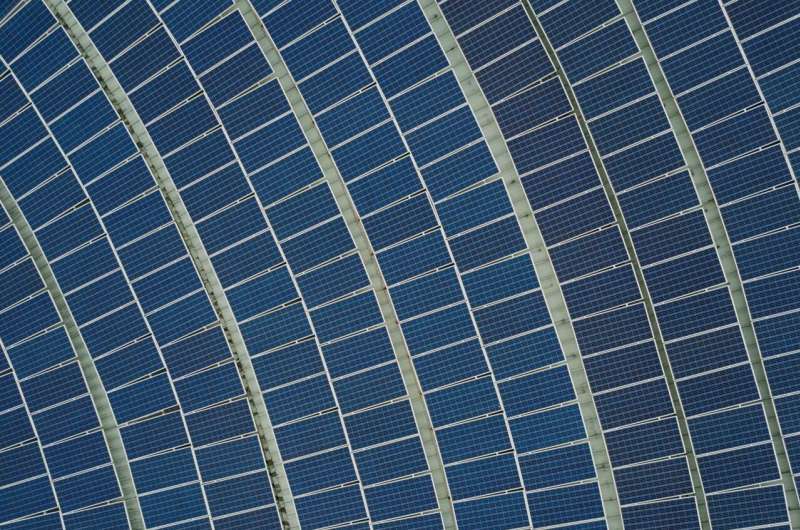This article has been reviewed according to Science X's editorial process and policies. Editors have highlighted the following attributes while ensuring the content's credibility:
fact-checked
proofread
Plummeting prices for solar power and storage make global climate transition cheaper than expected: Study

In just the past 10 years, the cost of electricity from solar has fallen by 87 percent, and the cost of battery storage by 85 percent. Wind power, heat pumps and other fossil-free technologies are also experiencing a sharp drop in prices. A study now compares the corresponding findings from innovation reports with the standard model-based scenarios on climate transition. It shows that, although the fight against global heating remains an enormous political challenge, new, cheaper pathways are opening up.
The study was led by the Berlin-based climate research institute MCC (Mercator Research Institute on Global Commons and Climate Change) and published in Energy Research & Social Science. The research team concludes that a good quality of life can be achieved with significantly less energy input.
"Some calculations even suggest that the world's entire energy consumption in 2050 could be completely and cost-effectively covered by solar technology and other renewables," reports Felix Creutzig, head of the MCC working group Land Use, Infrastructure and Transport, and lead author of the study.
"This is an extremely optimistic scenario—but it illustrates that the future is open. Climate science, which provides policymakers with guidance in its scenario models, must reflect technical progress as closely as possible. Our study is intended to provide input for this."
According to the study, the climate transition might proceed differently than expected. Currently, in scenarios compatible with the Paris Agreement (i.e. with global heating well below 2 degrees Celsius), it is expected that a lot of coal will continue to be burned in the future, and the resulting CO2 will be captured and stored underground.
The extensive burning of biomass (wood pellets, biogas and fast-growing plants cultivated on so-called climate plantations), combined with carbon capture and storage, is also anticipated, despite negative consequences for food production and biodiversity. But the research team is gathering evidence that fossil-free alternatives could become the gamechangers instead.
For example, batteries already cost less than 100 US dollars per kilowatt hour, which is significantly less than was predicted for the year 2030 in a publication two years ago. The price premium for battery storage, which makes solar power flexibly available in an optimal mix, will drop from currently 100 percent to only 28 percent in 2030.
One can observe the first maximizing electricity suppliers shutting down existing coal plants and replacing them with new hybrid solar-battery systems. In 2050, experts expect 63,000 terawatt hours of solar energy to be available worldwide—twice as much as is supplied by coal today.
And 80 percent of private investments in new energy capacity are now fossil-free. However, the research team points to the political economy of coal; considerations such as jobs, tax payments, political constraints or financial liquidity keep governments investing in coal even when renewables actually have a better pay-off.
The study also describes a comprehensive structural change that makes the climate transition cheaper. For example, solar cells, batteries, heat pumps and wind turbines are benefiting from the trend towards granular technologies—that is, solutions with simple elements that can be put together like Lego bricks to form larger systems.
Here, the pace of innovation is greater than with classic large-scale systems. In addition, new suppliers are having unexpected success with energy-saving solutions in everyday consumption—from vegan schnitzels in the supermarket to e-scooters on the road to the all-in-all device in the electrical shop.
Finally, sector coupling (direct and indirect electrification of transport, heating and industry) ensures much more energy efficiency and creates new options for storing green electricity—for example in e-cars, synthetic gases for industry, or e-fuels for aircraft and ships.
"Greenhouse gas emissions are higher than ever and the measures taken so far are too weak, but in this politically difficult situation, technological progress provides a ray of hope," says Jan Minx, head of the MCC Applied Sustainability Science working group and one of the co-authors. "New scenario models, some of which are starting to be explored, are likely to demonstrate in the foreseeable future that the global climate transition might not be as expensive as previously assumed, and may even be cost saving—provided it is finally tackled."
More information: Felix Creutzig et al, Technological innovation enables low cost climate change mitigation, Energy Research & Social Science (2023). DOI: 10.1016/j.erss.2023.103276

















